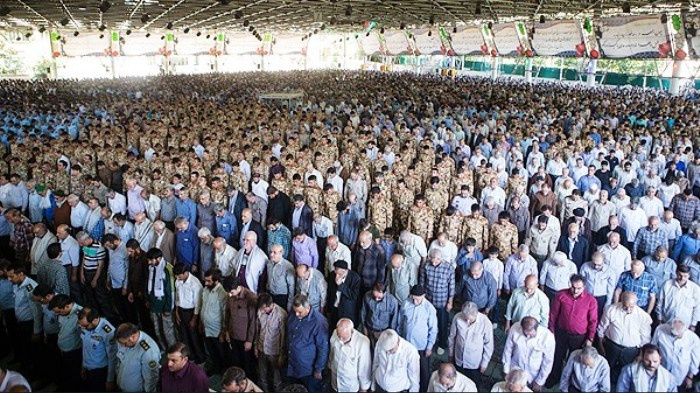Friday Prayers across Iran: Sacred Defense and JCPOA

(Tehran's Friday prayers. Source: Seyed Majid Tavakoli/Fars News)
September 22 marks the day the Iraqi dictator Saddam Hussein waged a bloody war against Iran. Iran fought the eight-year war with virtually no support, militarily or financially, from either the Eastern or Western bloc, but only calculated aids from Libya, Syria and North Korea. Understandably, the war left a deep impact on Iran's political and diplomatic mentality, and brought a sense of cynicism towards international relations. One that persists to date.
On the occasion of the 36 anniversary of the war, or as it is called in the official discourse, the Sacred Defense or the Imposed War, pre-sermon speakers, military commanders of the war time, and Friday prayers' leaders evoked the memory of the eight-year war and Iran' defenselessness against the army of Saddam Hussein and its advanced military, and called for nonstop reinforcement of Iran's military capabilities.
"Today, the region is stable because of our armed forces" and their power, said Kazem Seddighi, Tehran's Friday prayers' leader. "Thanks to the Sacred Defense, Iran's current military capability has stopped [the enemy] of even thinking of attacking Iran" stated Mohammad-Bagher Abdous, leader of Friday prayers in the northeastern city of Semnan. "If the enemy had a modicum of hope to succeed in a military attack on Iran, it would not hesitate for a moment" he said. In Qazvin, Abdolkarim Abedini praised the Supreme Leader for stressing the need to reinforce Iran's defense capabilities and for putting an end to "sinister whispers" that said Iran needs not to reinforce such capabilities, a thinly-veiled reference to Hashemi Rafsanjani's recent remarks on the need to downscale Iran's military budget. "No wise person abolishes its military" also said Mohsen Mojtahed Shabestari, Friday prayers' leader of Tabriz, center of Eastern Azerbaijan Province. "The enemy will stop military threats only when our military power increases and instills fear in the enemy" he argued.
Leaders of Friday prayers across the country continued bashing the US for non-delivery of its nuclear deal promises. In Ilam, western Iran, Mohammad-Taghi Lotfi asked Hassan Rouhani to follow the line of Supreme Leader Ayatollah Khamenei and adopt a decisive tone against the US instead of advising and complaining about Washington's renege on its promises. "We should not show weakness against them, but should retaliate in face of their arrogance" he said. In Mashhad, Ahmad Alamolhoda also cast doubt on the outcome of the nuclear deal between Iran and the West. Refuting government officials, Alamolhoda said that Iran "did not stop [another] war through JCPOA [Joint Comprehensive Plan of Action] and negotiations" but by the sacrifice of its 'defenders of the shrine', the term used by domestic media for Iranian military fighting in Syria. "If it was not for these defenders, the US and Daesh where in the middle of the country" Mashhad's sermonizer added.
Friday prayers' leaders across the country also touched on a wide range of domestic issues that did not sound pleasant to the ears of government officials. In Shahr-e Kord, center of the southwestern Chaharmahal & Bakhtiari Province, Mohammad-Ali Nekounam touched on the controversial topic of concerts, "a product of the West" according to him, that aimed to undermine religious sentiments in the Iranian society. In Shiraz, Assadollah Imani indirectly criticized the government for its objection to topics discussed in the Friday prayers, most recently the FATF-bashings. "Friday prayers' leaders […] are not spokesmen for the government or political parties" Imani said. "Iran's Friday prayers' leaders are different from those in Turkey, Egypt or Saudi Arabia" he asserted, adding that they would not follow any governmental "prescription".

